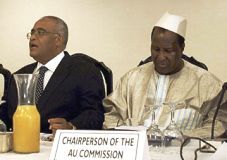AU mediators begin consultations with Darfur negotiators
ABUJA, June 13 (AFP) — Delegates at African Union-mediated peace talks aimed at resolving the crisis in Sudan’s western Darfur region began consultations on a declaration of principle which was adopted last December.

|
|
Chief mediator Salim Ahmed Salim (L) and African Union (AU) secretary general Alpha Konare (R) attend a summit on Darfur crisis in Abuja. (AFP). |
The latest round of talks between Khartoum and representatives of two rebel groups — the Sudan Liberation Movement (SLM) and the Justice and Equality Movement (JEM) — resumed Friday after a six-month break.
“The African Union (AU) distributed a draft copy of the declaration of principle to the two parties last night for our observations and comments”, SLM negotiating member Gamal Adam told AFP.
“Our team is holding consultations in order to make a presentation to the mediators later in the afternoon,” he said.
The talks to end civil war in Darfur, which has claimed between 180,000 and 300,000 lives, displaced 2.4 million people and sent another 20,000 fleeing to Chad, began in August 2003 but were suspended last December after mutual accusations of ceasefire violations.
AU spokesman Boubou Niang confirmed Monday’s development.
“Debate on the declaration of principle which we started last December will continue today. All the parties have been given a copy of the document. The AU will hold separate discussions with the parties from 3:00 pm (1400 GMT) with a view to harmonising positions on the document,” he said.
“The idea is to encourage wide consultations that will lead to compromises, consensus and agreements at this round of talks,” said Niang.
Sudan’s Deputy Foreign Minister Najeib Abdulwahab told AFP the government was optimistic about the talks.
“What is left is not problematic. The difficult issues have been agreed upon — the security and humanitarian issues. This week, we shall deal with declaration of principle from which we will distill the modalities for power and wealth sharing. People will not quarrel over principles,” he said.
“The government is looking forward to reaching agreement once and for all in order to achieve lasting peace in Darfur,” he added.
Sudanese government spokesman Ibrahim Mohammed Ibraahim urged the rebel groups to agree to peaceful settlement of the crisis.
“We appeal to our brothers in the movements to embrace peace so that our country can move forward,” he said.
JEM negotiator Mohammed Tugod told AFP the rebels were out to achieve peace. “We keep an open mind to issues. We will not work against any efforts to end the humanitarian crisis in Darfur.”
Another JEM delegate Abdullahi Osman El-Tom said: “We are upbeat about the current talks. The AU has done a lot to soften the ground since the last round of talks. We are hopeful this round will be ground-breaking.”
Violence broke out in Darfur in February 2003 when a rebel uprising against the government led Khartoum to unleash Arab militias known as the Janjaweed on a scorched-earth campaign. The Janjaweed are accused of “ethnic cleansing”, torture, rape and intimidation.
Humanitarian officials have warned that the situation in Darfur is becoming more desperate, with insufficient funding to meet the crisis aggravated by drought, famine and the long-term effects of conflict.
On Sunday, African mediators managed to bring the two parties together face-to-face, despite continuing splits.
But Sudanese Foreign Minister Mustafa Osman Ismail warned that his government was ready to walk out of the talks if AU mediators allowed Eritrea, considered an archfoe by Khartoum, to take part.
“Any role for Eritrea as a mediator in Abuja is unacceptable and is rejected because it is not neutral, nor is it a neighbour to Darfur like Chad, Libya and Egypt or an active African Union member like Nigeria, South Africa and some other countries,” Ismail told reporters.
He said the AU had been warned that “if the Eritrean delegation went into the meeting hall, the government delegation would not enter.”
Eritrea has long provided refuge to Sudanese opposition groups but denies accusations from Khartoum of arming their military wings. It accuses Khartoum in turn of supporting Eritrean rebel groups.
The Darfur rebels in turn oppose Chadian participation in the talks, accusing it of siding with Khartoum.
